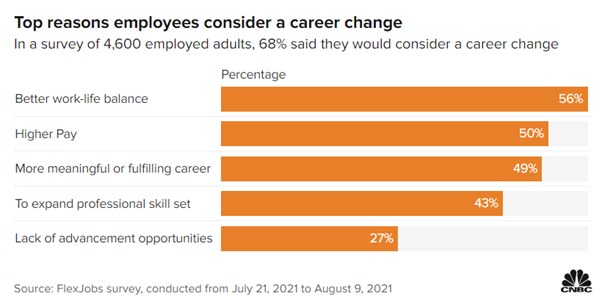
While there was a sharp decrease in people moving jobs during the pandemic, many consider that this will rapidly change as economies recover and surge. A LinkedIn article on the expected wave of employees planning to change jobs called the phenomenon “sheltering in job”. Based on the LinkedIn’s Workforce Confidence Index, some 74% of US employees surveyed, were practising some form of “sheltering in job”. They’re waiting out the pandemic, maintaining the financial security of a steady pay check before making their move. These findings are backed-up by a report from Achievers Workforce institute. It found that 52% of employees in North America intend to look for a new job this year. This creates a real challenge to HR Managers hoping to retain key staff.
Work-life Balance

There is no doubt that the workplace and employees’ views of their work life are changing. Even pre-pandemic, the workforce had become increasingly mobile. Many organisations were already toying with the idea of more flexible working habits to retain key staff. Now post-pandemic, the workplace has changed dramatically. It seems many are unwilling to return to the Monday to Friday, 9-5 routine. Travel and commuting no longer make sense to employees who have seen their work/life balance improved by avoiding long commutes. People found themselves with around two extra hours per day to spend with their families. They established healthier habits, like a daily walk or visit to the gym. Include the financial saving on public transport or parking then add the benefits to the environment and it’s hard to argue with the employee thinking. This is supported by Envoy’s research. It concluded 74% of employees would leave their jobs if their current employer did not allow them to continue with some form of remote working.

So why are they leaving?
The Flexjobs report form July 2021 has identified some of the main reasons people look for new positions. Top of the list is work/life balance. There is no doubt that after over 18 months of living with the Covid pandemic, people have examined and adjusted their priorities and expectations of what their work/life balance should look like. They have experienced the benefits of a new flexibility and are not going to give it up!

The other reasons are familiar. Higher pay, more meaningful and fulfilling career, to expand a professional skill set and lack of advancement opportunity. All of these reasons can be defined in the employee’s desire to progress. Employees need to feel they are learning, growing professionally and have a clear path in front of them.
A Meaningful Career
It is interesting that having a meaningful and fulfilling career ranks so highly in this survey. Could it be a response to recent rapid societal changes? And how the Covid 19 pandemic put the spotlight on inequality and the need for diversity? Change is disconcerting and people often struggle to find their place in a new environment. This has impacted organisations and there is a growing expectation for companies and industry leaders to take a stand and state their position in relation to movements like BLM and climate change. Employees also need to know where their organisation stands.
Create an Fulfilling Environment

HR managers can lead in building a work environment that manages employee expectations. Embedding a commitment to equality, diversity and sustainability into the company’s culture. This can contribute towards the employees feeling that they are part of the solution. It is fulfilling for employees to feel that as part of an organisation, they are playing a meaningful role in working towards change. This in turn would positively dispose employees towards their employer and give an added sense of meaning to their job.
Career Progression

The next thing to do is meet employee needs for career progression and expanding their skill set. Research from Middlesex University, Institute for Workplace Learning has shown that 74% of employees feel that they have not reached their full potential and would value more development opportunities. Offering training and upskilling meets the needs of both the employees and the organisation. With ever-changing technological advances offering new and more productive ways of working, nobody wants to feel left behind. Training also offers extra opportunities for employees to engage with their teams. Training in groups adds a social element that is often lacking in the new remote working environment. A good training webinar/workshop will generate brainstorming and new ideas that will increase creativity and motivation among workers.
New HR Challenges
There is no doubt that employee attitudes toward their work and their work/life balance are changing. HR managers face new challenges in retaining and engaging staff. But identifying the changes and being proactive in meeting the needs of employees and becoming a part of the new culture is a good start to meeting them.

I found this article very informative about “Are HR managers facing a post-pandemic tidal wave as employees exit their jobs?”. Looking forward for more informative articles like this related to Advanced Driveway Solutions
Delighted you found the blog useful. Thanks for reading!